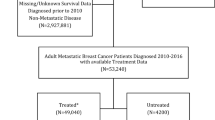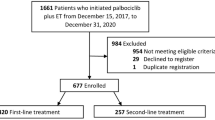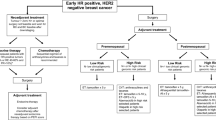Abstract
Breast cancer (BC) is the most common cancer in women worldwide, and has an undeniable negative impact on public health. The advent of molecular biology and immunotherapy has made targeted therapeutic interventions possible, providing treatments tailored to the individual characteristics of the patient and the disease. The over-expression of human epidermal growth factor receptor (HER) 2 is implicated in the pathophysiology of BC and represents a clinically relevant biomarker for its treatment. Trastuzumab, a recombinant antibody targeting HER2, was the first biological drug approved for the treatment of HER2-positive BC. Although there are currently other anti-HER2 agents available (e.g. pertuzumab and lapatinib), trastuzumab remains the gold standard for treatment of this disease subtype. Nonetheless, concerns have been raised regarding potential cardiotoxicity and treatment resistance. Moreover, several other therapeutic issues remain unclear and have been addressed in an inconsistent way. The current literature lacks a comprehensive review of trastuzumab providing useful information for clinical practice, including pharmacokinetic and pharmacodynamic aspects, its clinical use, existing controversies and future advances. This detailed review of trastuzumab in the pharmacotherapy of BC attempts to fill this gap.

Similar content being viewed by others
References
Benson JR, Jatoi I. The global breast cancer burden. Future Oncol. 2012;8:697–702.
Coughlin S, Ekwueme D. Breast cancer as a global health concern. Cancer Epidemiol. 2009;33:315–8.
Corbex M, Bouzbid S, Boffetta P. Features of breast cancer in developing countries, examples from North-Africa. Eur J Cancer. 2014;50:1808–18.
Duffy MJ. The war on cancer: are we winning? Tumour Biol. 2013;34:1275–84.
Tinoco G, Warsch S, Glück S, Avancha K, Montero AJ. Treating breast cancer in the 21st century: emerging biological therapies. J Cancer. 2013;4:117–32.
Lambert L. Biological drugs in breast cancer: increasing understanding for the pharmacist. S Afr Pharm J. 2014;81:24–7.
Garnock-Jones KP, Keating GM, Scott LJ. Spotlight on trastuzumab as adjuvant treatment in human epidermal growth factor receptor 2 (HER2)-positive early breast cancer. BioDrugs. 2010;24:207–9.
Patani N, Mokbel K. Herceptin and breast cancer: an overview for surgeons. Surg Oncol. 2010;19:11–21.
McKeage K, Lyseng-Williamson KA. Trastuzumab: a pharmacoeconomic review of its use in early breast cancer. Pharmacoeconomics. 2008;26:699–719.
Pinto AC, Ades F, de Azambuja E, Piccart-Gebhart M. Trastuzumab for patients with HER2 positive breast cancer: delivery, duration and combination therapies. Breast. 2013;22:S152–5.
Gradishar WJ. Emerging approaches for treating HER2-positive metastatic breast cancer beyond trastuzumab. Ann Oncol. 2013;24:2492–500.
Slamon D, Eiermann W, Robert N, Pienkowski T, Martin M, Press M, et al. Adjuvant trastuzumab in HER2-positive breast cancer. N Engl J Med. 2011;365:1273–83.
Incorvati JA, Shah S, Mu Y, Lu J. Targeted therapy for HER2 positive breast cancer. J Hematol Oncol. 2013;6:38.
De P, Hasmann M, Leyland-Jones B. Molecular determinants of trastuzumab efficacy: what is their clinical relevance? Cancer Treat Rev. 2013;39:925–34.
Cardoso F, Costa A, Norton L, Senkus E, Aapro M, André F, et al. ESO-ESMO 2nd international consensus guidelines for advanced breast cancer (ABC2). Ann Oncol. 2014;25:1–18.
Senkus E, Kyriakides S, Penault-Llorca F, Poortmans P, Thompson A, Zackrisson S, et al. Primary breast cancer: ESMO Clinical Practice Guidelines for diagnosis, treatment and follow-up. Ann Oncol. 2013;24(Suppl 6):7–23.
Senkus E, Kyriakides S, Ohno S, Penault-Llorca F, Poortmans P, Rutgers E, et al. Primary breast cancer: ESMO Clinical Practice Guidelines for diagnosis, treatment and follow-up. Ann Oncol. 2015;26:8–30.
Vu T, Claret FX. Trastuzumab: updated mechanisms of action and resistance in breast cancer. Front Oncol. 2012;2:62.
Emde A, Köstler WJ, Yarden Y. Therapeutic strategies and mechanisms of tumorigenesis of HER2-overexpressing breast cancer. Crit Rev Oncol Hematol. 2012;84(Suppl 1):49–57.
Bartsch R, Wenzel C, Zielinski CC, Steger GG. HER-2-positive breast cancer: hope beyond trastuzumab. BioDrugs. 2007;21:69–77.
Rexer BN, Arteaga CL. Optimal targeting of HER2-PI3K signaling in breast cancer: mechanistic insights and clinical implications. Cancer Res. 2013;73:3817–20.
Arnould L, Gelly M, Penault-Llorca F, Benoit L, Bonnetain F, Migeon C, et al. Trastuzumab-based treatment of HER2-positive breast cancer: an antibody-dependent cellular cytotoxicity mechanism? Br J Cancer. 2006;94:259–67.
European Medicines Agency. Summary of product characteristics: Herceptin. http://www.ema.europa.eu/docs/en_GB/document_library/EPAR_-_Product_Information/human/000278/WC500074922.pdf. Accessed 9 Feb 2016.
Azanza J-R, Sádaba B, Gómez-Guiu A. Monoclonal antibodies: pharmacokinetics as a basis for new dosage regimens? J Oncol Pharm Pract. 2015;21:370–6.
Leveque D. Subcutaneous administration of anticancer agents. Anticancer Res. 2014;34:1579–86.
Wynne C, Harvey V, Schwabe C, Waaka D, McIntyre C, Bittner B. Comparison of subcutaneous and intravenous administration of trastuzumab: a phase I/Ib trial in healthy male volunteers and patients with HER2-positive breast cancer. J Clin Pharmacol. 2013;53:192–201.
Plosker GL, Keam SJ. Spotlight on trastuzumab in the management of HER2-positive metastatic and early-stage breast cancer. BioDrugs. 2006;20:259–62.
Ismael G, Hegg R, Muehlbauer S, Heinzmann D, Lum B, Kim S-B, et al. Subcutaneous versus intravenous administration of (neo)adjuvant trastuzumab in patients with HER2-positive, clinical stage I–III breast cancer (HannaH study): a phase 3, open-label, multicentre, randomised trial. Lancet Oncol. 2012;13:869–78.
Pivot X, Gligorov J, Müller V, Barrett-Lee P, Verma S, Knoop A, et al. Preference for subcutaneous or intravenous administration of trastuzumab in patients with HER2-positive early breast cancer (PrefHer): an open-label randomised study. Lancet Oncol. 2013;14:962–70.
Pivot X, Gligorov J, Muller V, Curigliano G, Knoop A, Verma S, et al. Patients’ preferences for subcutaneous trastuzumab versus conventional intravenous infusion for the adjuvant treatment of HER2-positive early breast cancer: final analysis of 488 patients in the international, randomized, two-cohort PrefHer study. Ann Oncol. 2014;25:1979–87.
Jackisch C, Müller V, Maintz C, Hell S, Ataseven B. Subcutaneous administration of monoclonal antibodies in oncology. Geburtshilfe Frauenheilkd. 2014;74:343–9.
Hourcade-Potelleret F, Lemenuel-Diot A, McIntyre C, Brewster M, Lum B, Bittner B. Use of a population pharmacokinetic approach for the clinical development of a fixed-dose subcutaneous formulation of trastuzumab. CPT Pharmacomet Syst Pharmacol. 2014;3:1–9.
Jackisch C, Müller V, Dall P, Neumeister R, Park-Simon T-W, Ruf-Dördelmann A, et al. Subcutaneous trastuzumab for HER2-positive breast cancer—evidence and practical experience in 7 German centers. Geburtshilfe Frauenheilkd. 2015;75:566–73.
Ryan S, North R, Harvey V, Cox L. Medical resource utilization for administration of trastuzumab in a New Zealand oncology outpatient setting: a time and motion study. Clin Outcomes Res. 2015;7:423–30.
Levêque D, Gigou L, Bergerat JP. Clinical pharmacology of trastuzumab. Curr Clin Pharmacol. 2008;3:51–5.
Wynne CJ, Ellis-Pegler RB, Waaka DS, Schwabe C, Lehle M, Heinzmann D, et al. Comparative pharmacokinetics of subcutaneous trastuzumab administered via handheld syringe or proprietary single-use injection device in healthy males. Cancer Chemother Pharmacol. 2013;72:1079–87.
Moja L, Tagliabue L, Balduzzi S, Parmelli E, Pistotti V, Guarneri V, et al. Trastuzumab containing regimens for early breast cancer. Cochrane Database Syst Rev. 2012;4:CD006243.
Ismaili N, Elmajjaoui S, Tahri A, Benjaafar N, Errihani H, Belbaraka R. Trastuzumab in early breast cancer. Presse Med. 2013;42:1069–80.
Petrelli F, Barni S. Meta-analysis of concomitant compared to sequential adjuvant trastuzumab in breast cancer: the sooner the better. Med Oncol. 2012;29:503–10.
Du F, Yuan P, Zhu W, Wang J, Ma F, Fan Y, et al. Is it safe to give anthracyclines concurrently with trastuzumab in neo-adjuvant or metastatic settings for HER2-positive breast cancer? A meta-analysis of randomized controlled trials. Med Oncol. 2014;31:340.
Del Barco S, Ciruelos E, Tusquets I, Ruiz M, Barnadas A, SEOM. SEOM clinical guidelines for the systemic treatment of early breast cancer 2013. Clin Transl Oncol. 2013;15:1011–7.
Cardoso F, Costa A, Norton L, Cameron D, Cufer T, Fallowfield L, et al. 1st International consensus guidelines for advanced breast cancer (ABC 1). Breast. 2012;21:242–52.
Food and Drug Administration. Herceptin (Trastuzumab) Label. http://www.accessdata.fda.gov/drugsatfda_docs/label/2010/103792s5250lbl.pdf. Accessed 9 Feb 2016.
Cortazar P, Justice R, Johnson J, Sridhara R, Keegan P, Pazdur R. US Food and Drug Administration approval overview in metastatic breast cancer. J Clin Oncol. 2012;30:1705–11.
Perez EA, Romond EH, Suman VJ, Jeong J-H, Davidson NE, Geyer CE, et al. Four-year follow-up of trastuzumab plus adjuvant chemotherapy for operable human epidermal growth factor receptor 2-positive breast cancer: joint analysis of data from NCCTG N9831 and NSABP B-31. J Clin Oncol. 2011;29:3366–73.
Perez EA, Romond EH, Suman VJ, Jeong J-H, Sledge G, Geyer CE, et al. Trastuzumab plus adjuvant chemotherapy for human epidermal growth factor receptor 2-positive breast cancer: planned joint analysis of overall survival from NSABP B-31 and NCCTG N9831. J Clin Oncol. 2014;32:3744–52.
Gianni L, Eiermann W, Semiglazov V, Manikhas A, Lluch A, Tjulandin S, et al. Neoadjuvant chemotherapy with trastuzumab followed by adjuvant trastuzumab versus neoadjuvant chemotherapy alone, in patients with HER2-positive locally advanced breast cancer (the NOAH trial): a randomised controlled superiority trial with a parallel HER. Lancet. 2010;375:377–84.
Buzdar AU, Suman VJ, Meric-Bernstam F, Leitch AM, Ellis MJ, Boughey JC, et al. Fluorouracil, epirubicin, and cyclophosphamide (FEC-75) followed by paclitaxel plus trastuzumab versus paclitaxel plus trastuzumab followed by FEC-75 plus trastuzumab as neoadjuvant treatment for patients with HER2-positive breast cancer (Z1041): a random. Lancet Oncol. 2013;14:1317–25.
Ewer M, Suman VJ, Buzdar A, McCall LM, Meric-Bernstam F, et al. ACOSOG Z1041 (Alliance): cardiac events (CE) among those receiving neoadjuvant antracyclines (A) and taxanes with trastuzumab (T) for HER2+ breast cancer [abstract]. J Clin Oncol. 2013;31(Suppl):526.
Pivot X, Romieu G, Debled M, Pierga J-Y, Kerbrat P, Bachelot T, et al. 6 months versus 12 months of adjuvant trastuzumab for patients with HER2-positive early breast cancer (PHARE): a randomised phase 3 trial. Lancet Oncol. 2013;14:741–8.
Mavroudis D, Saloustros E, Malamos N, Kakolyris S, Boukovinas I, Papakotoulas P, et al. Six versus 12 months of adjuvant trastuzumab in combination with dose-dense chemotherapy for women with HER2-positive breast cancer: a multicenter randomized study by the Hellenic Oncology Research Group (HORG). Ann Oncol. 2015;26:1333–40.
Albanell J, Ciruelos EM, Lluch A, Muñoz M, Rodríguez CA. Trastuzumab in small tumours and in elderly women. Cancer Treat Rev. 2014;40:41–7.
Antolín-Novoa S, Blanco-Campanario E, Antón A, Gallegos-Sancho MI, Pérez-Carrión R, Peláez I, et al. Adjuvant regimens with trastuzumab administered for small HER2-positive breast cancer in routine clinical practice. Clin Transl Oncol. 2015;17:862–9.
O’Sullivan CC, Bradbury I, Campbell C, Spielmann M, Perez EA, Joensuu H, et al. Efficacy of adjuvant trastuzumab for patients with human epidermal growth factor receptor 2-positive early breast cancer and tumors ≤2 cm: a meta-analysis of the randomized trastuzumab trials. J Clin Oncol. 2015;33:2600–8.
Lambert JM, Chari RVJ. Ado-trastuzumab Emtansine (T-DM1): an antibody-drug conjugate (ADC) for HER2-positive breast cancer. J Med Chem. 2014;57:6949–64.
Ballantyne A, Dhillon S. Trastuzumab emtansine: first global approval. Drugs. 2013;73:755–65.
Maly JJ, Macrae ER. Pertuzumab in combination with trastuzumab and chemotherapy in the treatment of HER2-positive metastatic breast cancer: safety, efficacy, and progression free survival. Breast Cancer. 2014;8:81–8.
Mehta A, Tripathy D. Co-targeting estrogen receptor and HER2 pathways in breast cancer. Breast. 2014;23:2–9.
Ishizuna K, Ninomiya J, Ogawa T, Tsuji E. Hepatotoxicity induced by trastuzumab used for breast cancer adjuvant therapy: a case report. J Med Case Rep. 2014;8:417.
Sandoo A, Kitas GD, Carmichael AR. Endothelial dysfunction as a determinant of trastuzumab-mediated cardiotoxicity in patients with breast cancer. Anticancer Res. 2014;34:1147–51.
Jitawatanarat P, Connor TLO, Kossoff EB, Levine EG, Chittawatanarat K. Breast cancer safety and tolerability of docetaxel, cyclophosphamide, and trastuzumab compared to standard trastuzumab-based chemotherapy regimens for early-stage human epidermal growth factor receptor 2-positive breast cancer. J Breast Cancer. 2014;17:356–62.
Barroso-Sousa R, Santana IA, Testa L, de Melo Gagliato D, Mano MS. Biological therapies in breast cancer: common toxicities and management strategies. Breast. 2013;22:1009–18.
Xue J, Jiang Z, Qi F, Lv S, Zhang S, Wang T, et al. Risk of trastuzumab-related cardiotoxicity in early breast cancer patients: a prospective observational study. J Breast Cancer. 2014;17:363–9.
Ahmad S, Gupta S, Kumar R, Varshney GC, Raghava GPS. Herceptin resistance database for understanding mechanism of resistance in breast cancer patients. Sci Rep. 2014;4:4483.
Vu T, Sliwkowski MX, Claret FX. Personalized drug combinations to overcome trastuzumab resistance in HER2-positive breast cancer. Biochim Biophys Acta. 2014;1846:353–65.
Singh JC, Jhaveri K, Esteva FJ. HER2-positive advanced breast cancer: optimizing patient outcomes and opportunities for drug development. Br J Cancer. 2014;111:1888–98.
Zagouri F, Sergentanis TN, Bartsch R, Berghoff AS, Chrysikos D, de Azambuja E, et al. Intrathecal administration of trastuzumab for the treatment of meningeal carcinomatosis in HER2-positive metastatic breast cancer: a systematic review and pooled analysis. Breast Cancer Res Treat. 2013;139:13–22.
Bartsch R, Berghoff AS, Preusser M. Optimal management of brain metastases from breast cancer: issues and considerations. CNS Drugs. 2013;27:121–34.
Patil A, Sherbet GV. Therapeutic approach to the management of HER2-positive breast cancer metastatic to the brain. Cancer Lett. 2015;358:93–9.
Bousquet G, Darrouzain F, de Bazelaire C, Ternant D, Barranger E, Winterman S, et al. Intrathecal trastuzumab halts progression of CNS metastases in breast cancer. J Clin Oncol (Epub 29 Dec 2014).
Mego M, Sycova-Mila Z, Obertova J, Rajec J, Liskova S, Palacka P, et al. Intrathecal administration of trastuzumab with cytarabine and methotrexate in breast cancer patients with leptomeningeal carcinomatosis. Breast. 2011;20:478–80.
Oliveira M, Braga S, Passos-Coelho JL, Fonseca R, Oliveira J. Complete response in HER2+ leptomeningeal carcinomatosis from breast cancer with intrathecal trastuzumab. Breast Cancer Res Treat. 2011;127:841–4.
Ferrario C, Davidson A, Bouganim N, Aloyz R, Panasci LC. Intrathecal trastuzumab and thiotepa for leptomeningeal spread of breast cancer. Ann Oncol. 2009;20:792–5.
Colozza M, Minenza E, Gori S, Fenocchio D, Paolucci C, Aristei C, et al. Extended survival of a HER-2-positive metastatic breast cancer patient with brain metastases also treated with intrathecal trastuzumab. Cancer Chemother Pharmacol. 2009;63:1157–9.
Platini C, Long J, Walter S. Meningeal carcinomatosis from breast cancer treated with intrathecal trastuzumab. Lancet Oncol. 2006;7:778–80.
Stemmler HJ, Schmitt M, Harbeck N, Willems A, Bernhard H, Lässig D, et al. Application of intrathecal trastuzumab (Herceptin™) for treatment of meningeal carcinomatosis in HER2-overexpressing metastatic breast cancer. Oncol Rep. 2006;15:1373–7.
Author information
Authors and Affiliations
Corresponding author
Ethics declarations
Author contributions
Sofia Maximiano—acquisition, analysis and interpretation of data, drafting of the manuscript and technical support; Paulo Magalhães—analysis and interpretation of data, drafting of the manuscript and critical revision of the manuscript for important intellectual content; Mara Pereira Guerreiro—analysis and interpretation of data and critical revision of the manuscript for important intellectual content; Manuel Morgado—concept and study design and critical revision of the manuscript for important intellectual content.
Funding and conflict of interest
Sofia Maximiano, Paulo Magalhães, Mara Pereira Guerreiro and Manuel Morgado state that they have no conflicts of interest regarding the publication of this article. Research funding played no role in the study design; in the collection, analysis, and interpretation of data; in the writing of the report; or in the decision to submit the report for publication.
Rights and permissions
About this article
Cite this article
Maximiano, S., Magalhães, P., Guerreiro, M.P. et al. Trastuzumab in the Treatment of Breast Cancer. BioDrugs 30, 75–86 (2016). https://doi.org/10.1007/s40259-016-0162-9
Published:
Issue Date:
DOI: https://doi.org/10.1007/s40259-016-0162-9




